- Home
- Linda Castillo
A Gathering of Secrets Page 13
A Gathering of Secrets Read online
Page 13
I wait, willing her to continue, ignoring that small part of me that doesn’t want to hear what’s coming.
Pressing her hand against her stomach, she walks to the workbench, sets both hands against it, and leans. “I saw them one afternoon. Together. In the milk house. They were … on the floor by the stanchions. He was … on top of her … you know how they do. Her dress was…” Shaking her head, she doesn’t finish. “She was down there in all that manure. Just lying there for all the world to see. Like that, you know. Muck all over her dress.”
I choose my next words carefully. “Was it consensual?”
She squeezes her eyes closed. “At first I didn’t know. I mean, Danny was a handsome young man. And Emma was nearly a grown woman. Both were of Rumspringa age. I thought…” She breaks off, puts her hand over her mouth as if to smother a cry.
“Did he coerce her?” Too late I try to remove the edge from my voice. “Force her?”
She straightens, seems to gather herself, pull her emotions together. “Emma came to me. Later that night. She said he’d … you know, done things to her. Things she didn’t want him to do. She said they were … of one flesh.”
“He raped her?” I ask.
Tears glitter in her eyes, and within their depths I see the truth she doesn’t want to face. She doesn’t let the tears fall. To do so would be to admit the unthinkable and she’s not that strong. I watch her face as the pain gives way to denial. Even before she speaks I know she’s going to shift back to the only lie that will save her from herself. From a life of self-loathing because neither she nor her husband had kept their daughter safe.
“I told her good girls don’t do those kinds of things,” she whispers. “I told her to pray harder. That she should have resisted him. Resisted herself. I told her God doesn’t let things like that happen to good girls. She must’ve done something to tempt him and for that she should seek forgiveness.”
Tension grips the back of my neck like a vise. I stare at her, a violent tide of disgust rising inside me.
This isn’t the first time I’ve encountered that mind-set among the Amish. It’s one of the reasons I have a love-hate relationship with the community to which I was born. The part of me that is fourteen years old and shattered inside wants to strike out at her. Wants to snarl and scream, Your daughter came to you and you blamed her? How in the name of God could you do that to a teenage girl who’d come to you for help?
Sweat gathers beneath my arms, at the back of my neck, between my breasts. I look at her, wondering how she can live with herself. I want to ask her: If you’d listened to your daughter, if you’d protected her, would she still be alive?
“Did it happen more than once?” I ask.
“I don’t know. She didn’t speak of it again, but I think maybe it did.” She shrugs. “It’s such a private thing. You know, the things that happen between men and women. I thought they were, you know, beaus.”
“Does your husband know what happened?”
“Enough so that he doesn’t want to talk about it.”
“What does that mean?” I snap. “Did you tell him? Did Emma tell him? Did he see something, too?”
“I told him.”
Motive, a little voice whispers.
“How did he react?” I ask.
“He said they shouldn’t tell the bishop. If the bishop found out he would be forced to excommunicate them for six weeks. We didn’t want that to happen.” She looks down at the ground and then levels her gaze on mine. “Chief Burkholder, I know how all of this must sound to you, what you must be thinking.”
“I’m not thinking anything, Mrs. Miller.”
“I was not a bad mother to Emma.”
A hundred words tangle in my throat. None of them are kind, so I buckle it down and keep my mouth shut.
After a moment, she closes her eyes, presses her fingers to her lids as if to keep the dam from bursting. “If God were to give me another chance, I would have stopped Daniel.”
“Thank you for your time, Mrs. Miller,” I say, and I walk away.
* * *
God doesn’t let things like that happen to good girls. She must’ve done something to tempt him …
I can’t get the words out of my head. The thought of an Amish girl being abused in her own home is bad enough. But to know that girl went to her parents for help only to be blamed by them fills me with outrage. How could parents crush their daughter so completely, allow her to feel so hopeless, so betrayed, that she chose death over life?
The ugliness of the question drags me back to a time in my own life when I was that girl. The girl who still believed the world was a safe place and people were fundamentally good. The girl who had no concept of violence or the darkness that lurked in the depths of the human heart.
I was fourteen years old when Daniel Lapp walked into my mamm’s sunny farmhouse kitchen and destroyed everything I believed about the world and the people I knew. He stole my innocence, shredded any semblance of happiness, replacing both with shock and shame and numbing disbelief.
I don’t dwell on the past or what happened to me; I don’t let myself think about it and I damn sure don’t let it define me. But there are times, when I’m tired or my guard is down, that all those old emotions come creeping back. Sometimes when I close my eyes I still see his face. I see the way he looked at me, as if I weren’t there, just a piece of meat to be torn to bits, devoured, digested. I still feel the revulsion of his closeness, the stink of his breath, the pain of the violation. The sense of betrayal that followed.
No one came to help me that day. No one stepped in to defend me. I was alone with a monster, and I did what I had to do to survive. An act that, according to my parents, was the darkest sin of all.
Furious, hating the parallels, I rap my hand hard against the steering wheel. “They swept it under the rug,” I want to shout, not sure if I’m talking about what happened to Emma Miller or myself.
I’m northbound on Ohio 83 when suddenly I can’t get enough oxygen into my lungs. I clutch the wheel, order myself to calm down, get a grip. It doesn’t help.
My vision narrows and dims. I hit the brakes, pull onto the shoulder, stop hard enough to make the tires skid on gravel. For the span of a full minute, I hang on to the steering wheel so tightly my knuckles go white. The sound of buzzing fills my ears; I hear the pound of my heart beating out of control. I taste vomit at the back of my throat, grapple for the door handle, shove it open, spit.
“Goddamn you.” I choke out the words, not sure if I’m cursing my own weakness, my hapless parents, or the son of a bitch who caused so much pain in my life.
After a few seconds, the vise around my chest loosens. The haze clears. I become aware of traffic passing me on the road. The sound of a lawnmower somewhere nearby. The smell of fresh-cut grass. The call of a blue jay from the treetops in the woods to my right.
“Officer?”
I glance left to see a red SUV roll up beside me. A young woman in the passenger seat has her window lowered and she’s looking at me with concern. “Everything okay?”
“I’m fine.” I muster a smile. “Lunch didn’t agree with me.”
“Just checking.” She smiles back. “Have a good day.”
Closing my door, I watch the vehicle pull back onto the highway. I lean against the seat back and close my eyes, taking deep, slow breaths, trying not think about what just happened.
Too close to home, a little voice whispers.
The logical side of my brain reminds me that emotion has no place in police work. This case isn’t about me or my feelings. It isn’t even about Emma Miller, despite what happened to her. This case is about the murder of Daniel Gingerich. My job is to find the person responsible and build a case against them. The rest is up to the courts.
But I’m human and as imperfect as the next guy and I know better than most that emotions rarely cooperate with intellect. Daniel Gingerich wasn’t some innocent farm boy. If what I’m hearing is true, he was a rapi
st and a son of a bitch. I’d damn well better get used to it, because I’ve been charged with finding the person responsible for killing him despite the fact that some small, unacknowledged part of me believes he deserved his fate.
In terms of motive, the sexual assault and death of Emma Miller are important developments. If she was, indeed, raped, discovered she was pregnant, and committed suicide to escape the stigma and pain, those who loved her would have a pretty strong motive to seek vengeance on the perpetrator. That includes Elam Schlabach and Sam Miller. I think about her mother but dismiss the notion. Any woman who could blame her daughter for being raped possesses no sense of justice, not even the dark and twisted variety that leads to vigilantism.
CHAPTER 12
Life would be a hell of a lot easier if people just told you what they know the first time you talked to them, rather than stonewalling or lying or playing all those hide-and-seek games some folks are so damn fond of. No one understands better than I do the desire for privacy, particularly when there’s a personal tragedy involved. I get that, and I go out of my way to protect reputations at risk.
In dealing with the Amish, I know that their avoiding me isn’t necessarily an indicator of guilt, but a reflection of their “tenet of separation” from the rest of the world. Most Amish deal with “the English” on a daily basis with no problems. But some of the Old Order and Swartzentruber sects go to great lengths to avoid dealing with non-Amish individuals. I understand and respect their belief system. That said, I will not allow the mind-set to interfere with or hinder my investigation.
It’s a little after four P.M. and I’m in my office, resisting the urge to beat my head against the desk, when Lois rushes in. “Tip just came in over the line we set up for the Gingerich thing.”
Despite her enthusiasm, I don’t get too excited. So far the tip line has been as fruitful as a dead tree and I’m too discouraged to get my hopes up. “Go ahead, make my day.”
She slaps a notepad in front of me. “Female caller says Chris Martino, the neighbor, set the fire that killed Dan Gingerich. She claims there’s proof in Martino’s shed.”
It’s the last kind of information I expected. Even without hearing the details, I experience a precipitous rise of skepticism. “Did she say what kind of proof?”
“No.”
“Did she leave her name? Contact info?”
“She said she was scared of him and wants to remain anonymous.”
“Did you get a number?”
“The call came in from the Amish pay phone out on County Roads 407 and 58.”
A phone anyone could have used to make the call. Still, despite my doubts about its validity, I’m obliged to follow up. At the very least I need to find out if there’s any so-called evidence in Martino’s shed.
“Call Judge Siebenthaler and tell him I’m on my way over,” I say. “Tell him I need a warrant to search Chris Martino’s home.”
“You got it.”
But I know all too well that any warrant based on an anonymous tip is going to be a hard sell. Still, in light of the seriousness of the crime—and my lack of progress in producing a viable suspect—the judge might just bite.
Thinking about Martino and his temper, I ask, “Who’s on duty, by the way?”
“Skid came on about an hour ago.”
“Tell him to get over here. I’m going to put together a quick affidavit and head over to the judge’s chambers.”
* * *
Two hours later I’m armed with a warrant and on my way to the home of Chris Martino. Judge Siebenthaler wasn’t thrilled about issuing a warrant based on an anonymous tip. As a result, he limited my search to the shed. I wasn’t happy with it, but at this point I’ll take what I can get.
Skid rides shotgun in the passenger seat. “Might’ve been beneficial to wait until happy hour before laying that affidavit on the judge.” He grins. “Just sayin’.”
I try not to smile. It’s common knowledge that the judge spends most afternoons at the country club up in Millersburg and chases his usual nine holes of golf with a round or two of Woodford Reserve. “I don’t know,” I tell him. “This ‘tip’ seems a little convenient.”
“Someone with an ax to grind against Martino?” He shrugs. “He’s not exactly Mr. Charisma.”
“Or someone who wants to divert us,” I say. “It’s noteworthy that the caller had no interest in the reward money.”
“We do have one thing going for us, Chief.”
I glance over at him and raise my brows.
“Chris Martino might just be dumb enough to have set that fire and then left the torch and gas can in his shed.”
“You’ve rekindled my faith in mankind.”
Afternoon is giving way to evening when I pull into the weed-riddled driveway of the Martino place. There’s only one vehicle—Martino’s old pickup truck—so I pull up behind it and park adjacent to the shed. It’s a dilapidated building with a broken overhead door, siding that’s gone to rot, and half a dozen shattered windowpanes. It’s a relatively small building—about the size of a single-car garage.
Plucking the warrant from the console, I get out.
The air is hazy above the hip-high weeds and grass where insects swirl and crickets sing a raucous chorus. The windows of the house are open and chain saw rock blares from inside.
“Sounds like Martino’s having a hell of a party,” Skid says as he gets out.
“There’s an image I don’t want in my head.” I’m hoping Martino isn’t intoxicated.
We take the sidewalk to the house, go around to the front door, and ascend the steps to the porch. The door stands open about two feet. Through the screen, Neil Young proclaims that rock and roll will never die loud enough to rattle the windows. There’s no sign of Martino or anyone else; no movement inside.
Since Martino is a felon, it’s illegal for him to possess a firearm. That doesn’t mean he’s not armed. Worst case, he’s drunk and armed and pissed off.
Standing slightly to one side, I knock firmly. “Mr. Martino?” I call out. “Painters Mill Police Department. Can you come out here and talk to us a moment?”
Skid’s got a decent amount of experience under his belt. He’s laid-back, likes a good laugh, especially at the expense of someone else, and he doesn’t get too excited about much of anything. But I can tell he’s as antsy about this as I am.
I wait half a minute and knock again, using the heel of my hand. “Chris Martino! Painters Mill PD. Can you come out and talk to us!”
A thump sounds from inside. I tense, step right. Skid moves left, sets his hand over his sidearm, leans over to peer inside.
Through the screen, I see someone approach. An instant later the interior door swings open and Chris Martino appears on the other side of the screen. I step back, keeping him at a prudent distance. Yanking open the screen door, he staggers halfway out and squints at me, holding the door open with his right hand. “The fuck you pounding on my door for?” I glance past him, check for other individuals, but he appears to be alone. “Mr. Martino, can you come out here and talk to us for a moment please?”
“What’s this about?” The big man moves through the door, steps onto the porch, and lets the screen door slam behind him. His hair is mussed, standing up on one side. He’s wearing a white T-shirt and blue jeans with flip-flops. Dirty feet. Dirty hair. He’s impaired, but not unsteady on his feet. I can smell the alcohol on his breath from where I stand. His eyes are glassy and red, telling me he’s likely on something else, too. Either a narcotic or prescription drug or all of the above.
“Okay, here I am. What do you want?”
“You alone this afternoon, Mr. Martino?” I ask.
“Just me and Jack Daniel’s.”
I hand him the neatly folded document. “This is a warrant, Chris. I suggest you read it carefully. We have permission to conduct a search.”
“A search?” He stares down at the warrant as if I’ve handed him a live snake, but he doesn’t unfold it;
he doesn’t read. Instead, he raises his gaze to mine. A weird smile overtakes his face. He’s got a missing eyetooth. The rest are yellowed from tobacco. “Just out of curiosity, what the hell are you looking for?”
“Everything you need to know is in the warrant.” I look past him, toward the interior of the house. “Do you mind if we come inside and take a look around?”
A search of the house isn’t included in the warrant, but it never hurts to ask. If he grants us permission, we can lawfully conduct a search and use anything we find in whatever manner we see fit.
Martino unfolds the warrant. “If it ain’t in the warrant, you ain’t coming in.”
Skid and I wait while he reads. After a full minute he looks up at me and smiles nastily. “Fuckin’ Nazi cops.”
“Thank you, Mr. Martino.” I step back. “We’re going to go ahead and take a look in that shed, then we’ll get out of your hair.”
“Knock your socks off,” he says. “You ain’t going to find shit unless you plant it.”
Skid and I turn and start toward the shed. When we’re out of earshot, Skid mutters, “That’s one squirrely son of a bitch.”
The overhead door is open about a foot, but has fallen off the track and hangs at a precarious angle. We go around to the side door. Skid tries to open it, but it jams and he has to put some muscle into it. Not for the first time I’m glad I brought him along.
“Holy cow,” he mutters as we enter.
My heart sinks when I get my first look. The small space is jam-packed with every imaginable variety of junk. An old car of indiscernible origin is parked in the center of the mess. Both front fenders are missing. One tire is gone, the other is flat. The hood is raised about a foot. Every square inch of the rusted metal is covered with bird droppings. I look up and see half an inch of buildup on the rafters and I realize it’s a pigeon roost.
Beyond the vehicle, a wheelbarrow lies on its side. An ancient bicycle is propped against the wall. Half a dozen clay pots sit on the concrete ledge of the footer. An old door that’s being used as a workbench is covered with what looks like engine parts. Cinder-block-and-board shelving lines the far wall. The stink of bird droppings, dust, and moldering wood permeates the air.

 A Hero to Hold
A Hero to Hold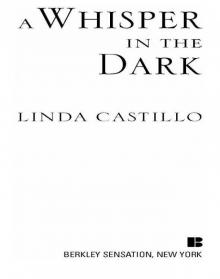 A Whisper in the Dark
A Whisper in the Dark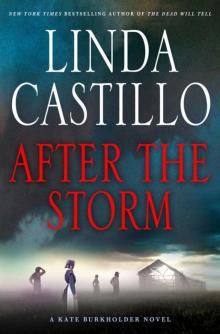 After the Storm
After the Storm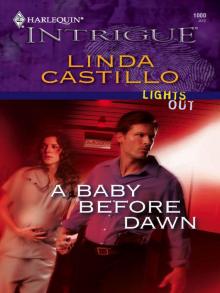 A Baby Before Dawn
A Baby Before Dawn Breaking Silence
Breaking Silence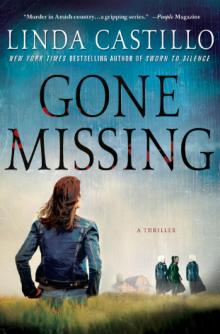 Gone Missing
Gone Missing Long Lost
Long Lost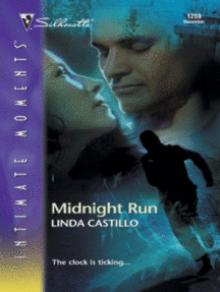 Midnight Run
Midnight Run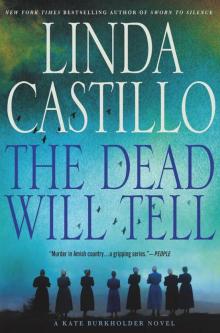 The Dead Will Tell
The Dead Will Tell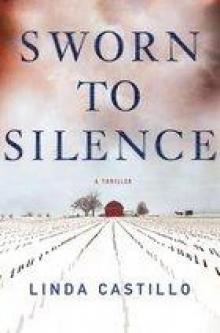 Sworn to Silence
Sworn to Silence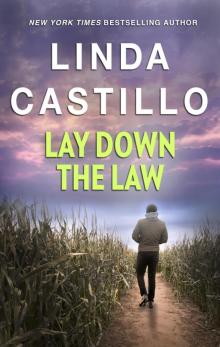 Lay Down the Law
Lay Down the Law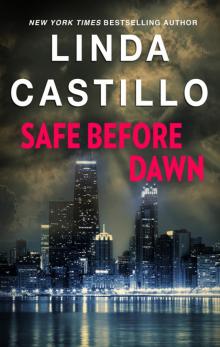 Safe Before Dawn
Safe Before Dawn Depth Perception
Depth Perception Seeds of Deception
Seeds of Deception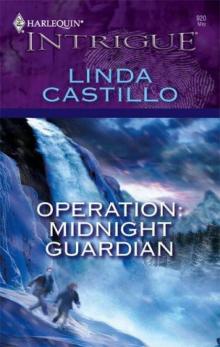 Operation: Midnight Guardian
Operation: Midnight Guardian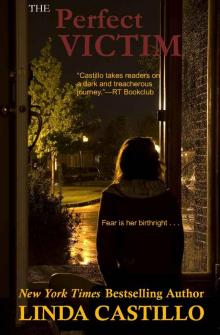 The Perfect Victim
The Perfect Victim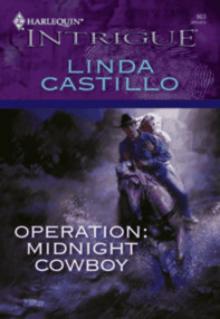 Operation: Midnight Tango
Operation: Midnight Tango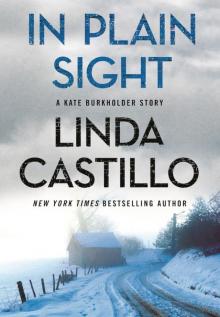 In Plain Sight (Kate Burkholder)
In Plain Sight (Kate Burkholder) Shamed
Shamed Fallen
Fallen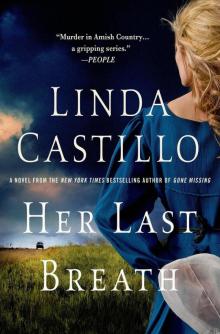 Her Last Breath
Her Last Breath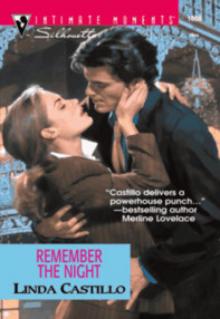 Remember the Night (Men in Blue)
Remember the Night (Men in Blue) Dead Reckoning
Dead Reckoning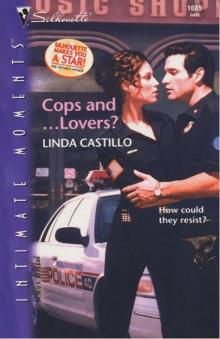 Cops and ... Lovers?
Cops and ... Lovers? The Pact
The Pact A Simple Murder
A Simple Murder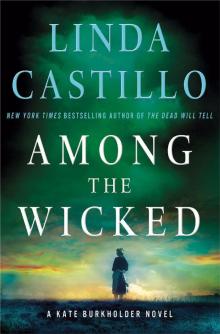 Among the Wicked
Among the Wicked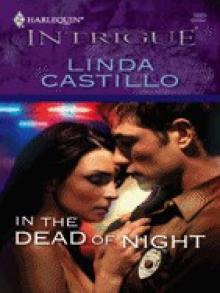 In the Dead of Night
In the Dead of Night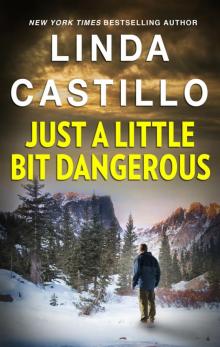 Just a Little Bit Dangerous
Just a Little Bit Dangerous The Phoenix Encounter
The Phoenix Encounter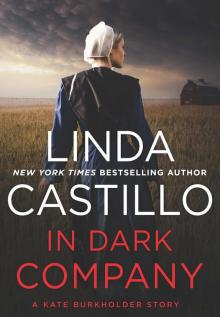 In Dark Company
In Dark Company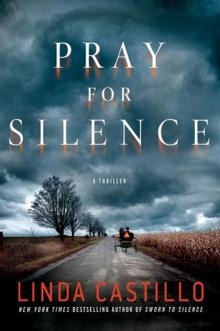 Pray for Silence
Pray for Silence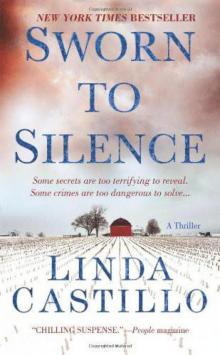 Kate Burkholder 01-Sworn to Silence
Kate Burkholder 01-Sworn to Silence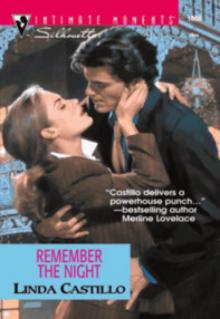 Remember the Night
Remember the Night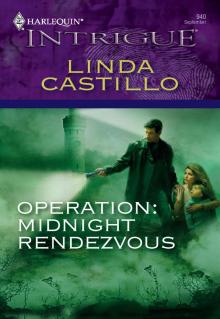 Operation: Midnight Rendezvous
Operation: Midnight Rendezvous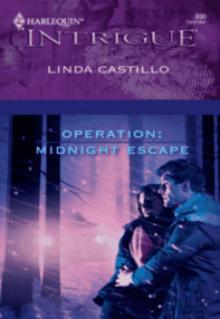 Operation: Midnight Escape
Operation: Midnight Escape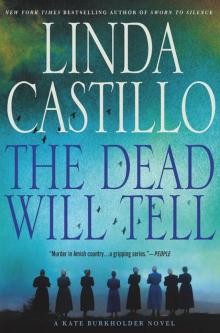 The Dead Will Tell: A Kate Burkholder Novel
The Dead Will Tell: A Kate Burkholder Novel Seeds of Deception: A Kate Burkholder Short Story
Seeds of Deception: A Kate Burkholder Short Story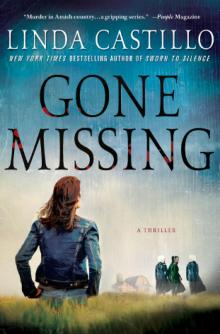 Gone Missing (Kate Burkholder 4) kb-4
Gone Missing (Kate Burkholder 4) kb-4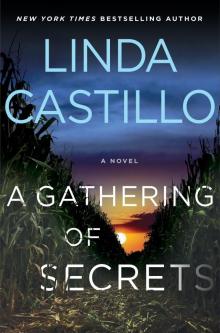 A Gathering of Secrets
A Gathering of Secrets Seeds of Deception: A Kate Burkholder Short Story (Kindle Single)
Seeds of Deception: A Kate Burkholder Short Story (Kindle Single)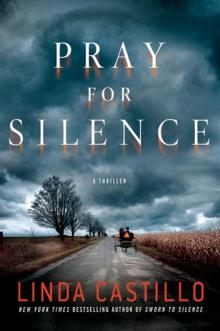 Pray for Silence kb-2
Pray for Silence kb-2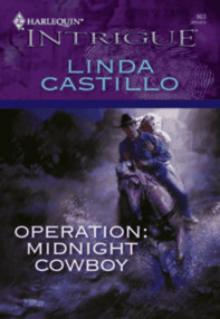 Operation: Midnight Cowboy
Operation: Midnight Cowboy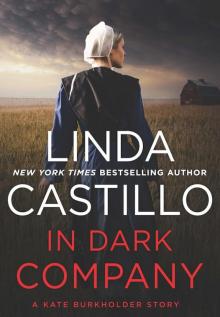 In Dark Company_A Kate Burkholder Short Mystery
In Dark Company_A Kate Burkholder Short Mystery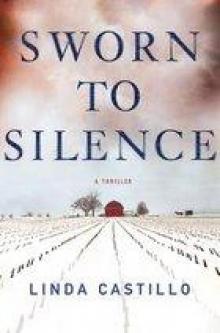 Sworn to Silence kb-1
Sworn to Silence kb-1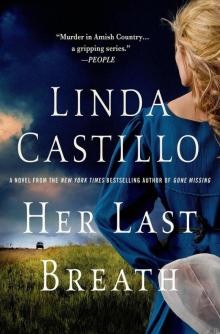 Her Last Breath: A Kate Burkholder Novel
Her Last Breath: A Kate Burkholder Novel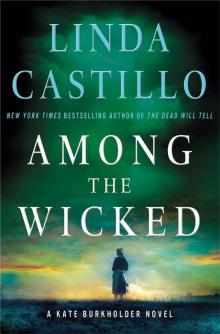 Among the Wicked: A Kate Burkholder Novel
Among the Wicked: A Kate Burkholder Novel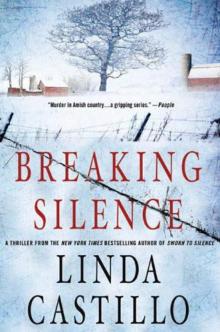 Breaking Silence kb-3
Breaking Silence kb-3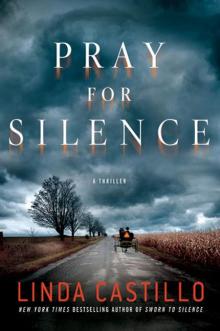 Kate Burkholder 2 - Pray for Silence
Kate Burkholder 2 - Pray for Silence Long Lost: A Kate Burkholder Short Story
Long Lost: A Kate Burkholder Short Story